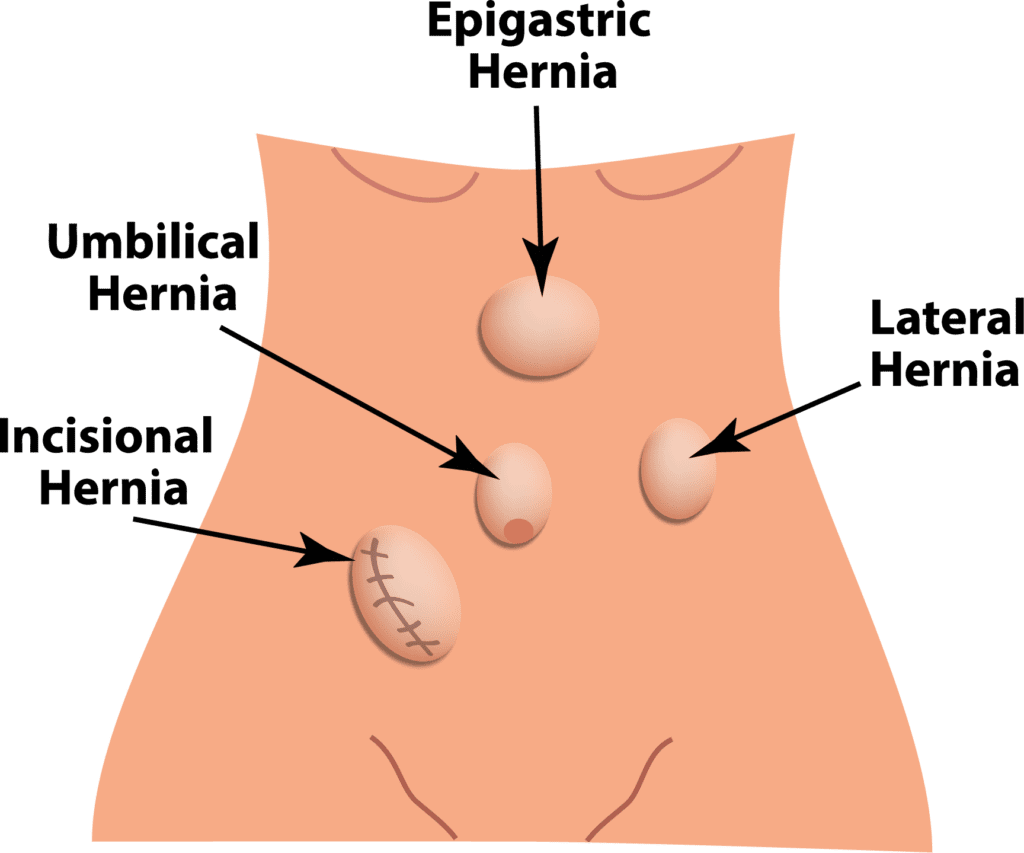Ventral Hernias
Contact Us Today to Make an AppointmentTo make an appointment with a member of the Brown Surgical Associates' Comprehensive Hernia Center, call 401-553-8349. |
A ventral hernia occurs at a weak point on the front of the abdominal wall musculature. Intestines or fat can bulge through this weakness causing a lump in a variety of locations. A Hernia is simply a “hole.” The abdominal wall is made of different layers, the skin, the adipose tissue, the muscles. Behind the muscles, there is a very strong layer called fascia. The fascia keeps everything that is supposed to stay inside the abdomen inside, but sometimes because of previous surgery, pregnancy, trauma, or just aging, some tears in that fascia may appear. Those tears or holes are the hernias, and they allow passage of intra-abdominal contents into the layers beneath the skin.
Ventral hernias can range in complexity from small hernias requiring a relatively simple surgical repair to very large hernias requiring a complex abdominal wall reconstruction. The Brown Surgical Associates Comprehensive Hernia Center has surgeons who specialize in all types of ventral hernia repair.
Find an expert in ventral hernia repair »
Find an expert in complex abdominal wall reconstruction »
Types of Ventral Hernias
Epigastric Hernia – a hernia above the belly button (umbilicus) which is commonly present at birth. It is typically recommended to have this repaired if symptomatic. Your surgeon may recommend observation if asymptomatic.

An incisional hernia is one that occurs at a previous incision site or an incompletely healed surgery site.

An umbilical hernia is one that occurs at the belly button (umbilicus).

A Spigelian hernia is one that occurs on the side of the abdomen.

A parastomal hernia is one that occurs at the site of a prior or current ostomy.

Risk Factors for Ventral Hernias
 There are multiple risk factors for developing hernias: previous surgery, obesity, diabetes, trauma, pregnancy, professions requiring heavy lifting, and genetics.
There are multiple risk factors for developing hernias: previous surgery, obesity, diabetes, trauma, pregnancy, professions requiring heavy lifting, and genetics.
Signs and Symptoms of Ventral Hernias
In most patients symptomatic ventral hernias present with a bulge and/or pain at the hernia site when engaging abdominal wall core musculature. This can happen after coughing, sneezing, heavy lifting, bowel movements, or standing for long periods of time. Rarely a ventral hernia may become strangulated with the contents (either fat or bowel) becoming stuck within the hernia and losing its blood supply. This is an emergency and would require an emergent repair.

Diagnosis of Ventral Hernias
The best way to diagnose a ventral hernia is to contact your physician for a physical exam. Detecting a ventral hernia during an exam is typically done by having the patient lie down while the surgeon palpates the abdominal wall feeling for the hernia defect.
Additional studies may be required to diagnose your hernia. These may include an ultrasound, CT scan, or MRI.
Treatment for Ventral Hernias
Treatment options include:
- Observation – After consultation with your surgeon, minor asymptomatic hernias may be observed if there are no concerning features.
- Elective hernia repair – If the hernia is causing significant symptoms your surgeon may recommend hernia repair on a non-emergent basis.
- Emergent hernia repair – If there are signs of bowel stuck within the hernia this may require emergent repair as the blood flow to the bowel may become compromised.

Surgical approaches include:
- Open hernia repair – This is done by making a small incision directly over the hernia. The hernia defect is then closed with a combination of suture material and mesh.
- Laparoscopic hernia repair – This is done with several small incisions and a laparoscopic telescope is used to visualize the hernia defect. Using this minimally invasive approach the hernia is repaired from the inside.
- Robot-assisted hernia repair – The robotic approach to hernia surgery utilizes small incisions similar to the laparoscopic approach. Hernias that are unable to be repaired laparoscopically may be amenable to repair with a minimally invasive approach using the robotic platform.
Experts in Abdominal Wall Reconstruction »
Don't suffer in pain.
Make an appointment today!
To make an appointment with a member of the Brown Surgical Associates' Comprehensive Hernia Center, call 401-553-8349.



